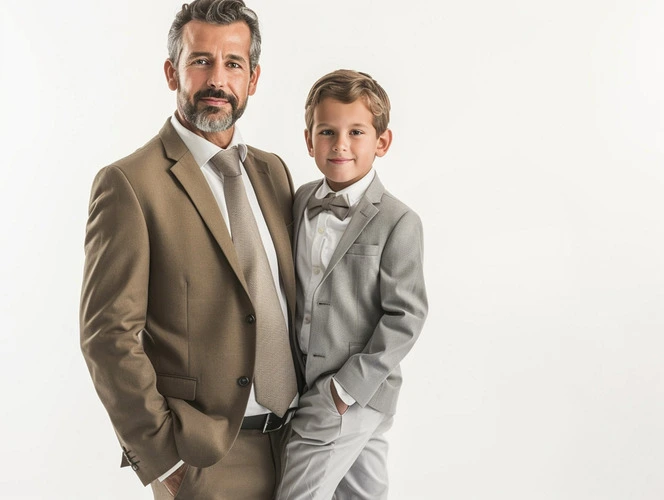Is entrepreneurship something we inherit through our genes, or is it shaped by our environment and experiences? Until recently, I hadn’t given this much thought. But as I reflect on my own journey, I realize how important this question can be for anyone wondering if they possess that elusive “entrepreneurial spirit.”
The Influence of Family and Early Environment
I come from a family of business owners. My father was a successful entrepreneur, as were his parents and even one of my great-grandparents. Out of four siblings, two of us pursued entrepreneurship, while the other two chose different paths.
Growing up, I had a front-row seat to my father’s business acumen. I watched him master sales, negotiate deals, and use his charisma to build relationships. These early experiences undoubtedly shaped my understanding of business.
At the age of 9, I unknowingly took my first entrepreneurial step. My love for reading led me to open a small book rental business outside my parents’ house. It was a simple operation—kids from the neighborhood would rent books, and when I noticed they liked to stay and read, I expanded. I began selling snacks, water, and tea so they could read comfortably.

To handle kids who didn’t return my books on time, I came up with a smart plan. I’d visit their homes during lunch or evening hours—times when I was sure their parents would be around. I’d politely explain that their kids owed me the rental fee plus a late return fine, and that my books needed to be returned immediately. This strategy worked like a charm. Most kids rushed to bring the books back to my store and paid the overdue fees without further delay.
For three summers, my little business thrived. I earned enough to pay for my own books, buy beautiful dresses for the next school year, and even save a little.
The Fear of Being Different
At 12, everything changed. I became self-conscious. Kids from school passed by my bookstore and laughed. My family was wealthy—I didn’t need to work. Yet there I was, working every day during the summertime instead of playing which felt like a signal of financial struggle.

I felt ashamed. That summer, I shut the business down. From that point on, until I was 29, I never started another venture. The idea of becoming an entrepreneur didn’t even cross my mind. Instead, I embraced a more conventional, safer, and predetermined path—studying hard, graduating, and finding a stable job. It felt like the right thing to do, a path society praised and one I thought would lead to security and success.
Cultural Conditioning and Ambition
Growing up in Vietnam during the 1990s and early 2000s, I was immersed in a world where traditional gender roles held firm. Yet, even as a child, I harbored an unshakable desire for independence, a longing to live life on my own terms. My vision of freedom was shaped by glimpses of Western movies and documentaries, where young people worked part-time jobs, lived on their own, and seemed to navigate life with absolute autonomy. It seemed so foreign, yet so liberating—a life where I could support myself and pursue my passions without being tethered to anyone or anything.
However, cultural norms had a way of seeping in unnoticed. I was raised to believe that a woman’s primary purpose was to build a family and support her partner. Career success, especially in leadership, was often seen as a threat to personal relationships. The unspoken rule? Ambitious women intimidate men and might struggle to find a partner.
While I outwardly rejected these limiting beliefs, the seeds of doubt they planted still lingered in the back of my mind Could being too ambitious actually be a liability?
Deep down, I longed for financial independence, a fulfilling career, and the freedom to carve out my own path. Yet, the pressure to balance societal expectations with my personal aspirations weighed heavily. Rather than pushing for the top, I chose what I thought was a middle ground: becoming a marketing manager or team leader. It felt like the perfect compromise—challenging enough to satisfy my ambitions, but modest enough to avoid overshadowing a future partner.
Looking back, I realize how much internal conflict I experienced even after building multiple successful businesses and gaining a strong reputation. I was torn between expanding further—achieving more—and holding back to preserve what I thought was a sense of balance.

Interestingly, as my career flourished, my personal life seemed to stall. Before I ventured into entrepreneurship, relationships came easily. One would follow another with little to no time between them. Every New Year’s Eve, I’d make the same wish: for the Universe to give me a break from relationships and allow me to enjoy being single for a while. But no matter how often I wished, love always seemed to find me, again and again.
But everything changed once I became an entrepreneur. Singlehood wasn’t just a passing phase anymore—it became a constant companion. Despite countless wishes and attempts to find someone special, the relationships that once came so easily now seemed elusive. It felt as though singlehood had become my most loyal companion, refusing to leave no matter how much I longed for a change.
The world around me seemed to reinforce the idea that the more successful I became, the more intimidating I would appear. Male clients often praised my talent but added, “You’re such a powerful woman; not many men could handle you.” Some even suggested that my success could make it difficult for me to find a partner because I was “too strong, too independent, or too ambitious.”
Although these comments were framed as compliments, they only reinforced the cultural conditioning I thought I had outrun. They reminded me of the unspoken expectation that women should dim their light to make others feel comfortable.
I’ve always prided myself on being rebellious, refusing to conform to society’s standards or others’ opinions of me. Yet, despite this defiance, there was still a part of me deeply influenced by those ingrained beliefs. It wasn’t until I found myself under investigation for tax evasion (more details in my book that I had the space to truly reflect and undergo a complete transformation. That moment became the turning point, where I finally broke free from the internal conflicts that had held me back for so long.
Funny enough, as I finally broke free from those internal conflicts, my fiancé entered my life at the perfect time. He actually fell head over heels for me—because of my ambition, intelligence, and independence. He celebrated everything I had once seen as my limitations. He loved my quirks, admired my thirst for knowledge, and cherished my success. In that moment, I realized just how wrong I had been. The very qualities I thought would keep me alone were the ones that made me whole and truly loved. It turns out that being unapologetically myself was the key to finding someone who not only matched my ambition but admired it.
How I Got Pushed (Not Pulled) Into Entrepreneurship
Let’s set the record straight: Since that book rental business, starting any type of business was never on my radar. I didn’t wake up one day with a burning desire to be an entrepreneur. Nope. Life pushed me into it—kicking and screaming.
The “Holy Shit” Moment That Changed Everything
By my third year at the company, I was working on a side project with my temporary team lead. Together, we launched a new business model—email marketing (remember, email was still fresh in 2016). To everyone’s surprise, it was an immediate success. In just six months, we pulled in €500,000 in revenue, and it wasn’t just revenue—it was fat, juicy profit. How often do you see a business take off so fast and pull in half a million? Not often!
When the annual performance review came around, I had one thought: “Oh man, I’m about to be rewarded handsomely!” Spoiler alert: I wasn’t.
Sitting across from the CEO, I got a pat on the back for my hard work, a 5% raise, and a €1,000 bonus. After taxes, that came to around €500.
Let me tell you, there’s nothing more jarring than realizing your hard work is met with words of praise—but peanuts when it comes to rewards. I wasn’t expecting millions, but €500 after half a million in revenue? Seriously? The inflation rate was 2.5%, and my salary increase was just 5%. Talk about a slap in the face.
At 28, still immature and full of ego, I was crushed. Without thinking, I bluntly told the CEO that I was disappointed—his lack of appreciation for my hard work, his stinginess, and his inability to recognize talent. It escalated quickly, and I ended up quitting on the spot.

The CEO was furious. I guess it was the first time anyone had ever called him out so boldly. The meeting ended in a heated exchange.
Once I left the room and started processing what had just happened, panic set in.
“Shit, how am I going to pay the mortgage on my apartment, which I’d just bought over a year ago? I’ve only got €1,000 in savings… that’ll last, what, three weeks? And I’ve still got a month of salary coming in before my resignation notice takes effect.”
Despite the impulsiveness of quitting—and honestly, a bit of immaturity—I quickly realized staying wasn’t an option. The company culture had become unbearable. The office politics, the endless delays in decision-making (even for simple issues), and the backstabbing drained me. I wanted to push boundaries, innovate, and achieve more. But to do that, I needed others to step up as well. Most weren’t interested. As long as they were meeting their job descriptions, they were satisfied. No extra effort, no going above and beyond. I was driven to make things happen, but I felt stuck in a sea of people who were just getting by.
A Light at the End of the Tunnel (Or So I Thought)
Thankfully, my temporary team lead introduced me to Joost, an entrepreneur who was absolutely killing it in email marketing. Our meeting went incredibly well—there was a great vibe, and everything pointed to the fact that this could be my next big step.
As I was gearing up to leave, my CEO oh-so-casually reminded me about the competition clause in my contract—something I had completely forgotten about. When I first signed on, I never imagined that I would become an asset so quickly that a company would use such a clause to block my next move. Over the years, I’d watched countless colleagues come and go without ever hearing about competition clauses, so I never thought it would apply to me.
Turns out, it was serious. I was forbidden from working for a competitor for six months. If I broke that clause, I’d be facing a hefty fine.
The CEO was blunt: if Joost hired me, both of us would be sued.
I was young, naive, and terrified. Just hearing the word “sue” sent my mind into full-blown panic mode.
Joost, who wasn’t by no means young and naive but probably just as scared—if not more—backed out faster than I could form a strategy.
I felt completely blindsided. Here was a guy who had practically rolled out the red carpet for me, but as soon as a small obstacle appeared, he tossed me aside like an afterthought. It wasn’t just disappointing; it felt like a betrayal.
And so, there I was: jobless, broke, with a mortgage hanging over me like a dark storm cloud. Classic life drama, right? Just when you think you’ve got everything figured out, life pulls the rug out from under you.
A Coffee That Changed Everything
During my last week at the company, I sent out farewell emails to clients, and within minutes, I received a reply from Jeroen. He invited me for coffee.
Jeroen’s business was heavily reliant on my email marketing work, and with me leaving, his sales were about to face a major obstacle. The company I had just left? No one there had any clue about email marketing, let alone how to manage the complex systems I’d spent countless hours setting up and fine-tuning.

I assumed Jeroen was about to offer me a job, but once again, I was completely wrong.
But this time? It was the kind of wrong that turned everything upside down.
Over coffee, Jeroen dropped a bombshell: “What if we start a company together?” he asked. He offered me double my previous salary, a 10% equity stake, and performance bonuses on top of that. But the real kicker? He’d give me full creative control to shape the company as I saw fit—while he provided the support I needed.
Unlike Joost, who had bailed at the first sign of trouble, Jeroen promised he would personally speak to my old CEO to handle the competition clause and ensure a smooth transition. No legal battles, no stress.
It was like I’d just dodged a bullet. The sense of relief was overwhelming.
The Leap of Faith
I was excited. And I was terrified. Like, seriously, I nearly had a panic attack. I had zero experience running a business. Sure, I was good at marketing campaigns, but running an entire company? That was a whole different game.
I had one condition: Jeroen had to convince my former temporary team lead to join us. He brought critical skills I didn’t have—technical expertise, business acumen, and a calm demeanor under pressure. I knew that without him, this venture wouldn’t succeed.
Luckily, my team lead agreed to come on board. We had spent two amazing years working together, and he knew exactly what we were capable of. Like me, he was disillusioned with the company’s culture and management. He was just as ready to jump into something new, something that would let us make a real impact.
After we signed the contract, Jeroen took me to the Apple Store in Leidseplein, a bustling square in the heart of Amsterdam’s city center, just a short walk from our new office on Prinsengracht. It’s one of those iconic spots that no tourist visiting Amsterdam can miss. He turned to me and said, “Pick whatever you need. Don’t worry about the price.”

I had never worked with Apple products before, so I wasn’t sure what to grab. But let’s be real—I’m not one to shy away from the finer things. So, I picked out the most expensive MacBook Pro, keyboard, and mouse (Hehehe). And then, in typical Jeroen fashion, he told me to take a second lap around the store. “If you need anything else, grab it. Or if you forget something, order it later through the company account.”
Now, I won’t lie—I was shocked. No boss, no company, had ever been that generous with me. Honestly, I didn’t even know how to process it. But more than the tech, more than the MacBook, it was the feeling of genuine appreciation. That was the moment I realized what it meant to be truly valued. It wasn’t about the price tag; it was about the respect and trust Jeroen was showing me.
Anyone who says money and material things don’t matter probably hasn’t had the experience of being told to pick out anything you want without looking at the price tag. It wasn’t just about getting nice things; it was about the confidence it gave me. It was the first time I felt truly seen, recognized for what I could bring to the table—not just as a worker, but as a partner.
That moment solidified everything for me. Even today, I still reflect on it as one of the key reasons I took the leap to join the company. Despite my fears and uncertainties, Jeroen’s faith in me gave me the foundation I needed to take the next step.
From Panic to Entrepreneurship
That’s how I became an entrepreneur—it didn’t arrive with a polite knock; it stormed in, completely uninvited. One moment, I was panicking over a mortgage and watching my savings dwindle; the next, I was signing papers to own a piece of a business. It was a terrifying leap of faith, but it taught me an invaluable lesson: Sometimes, being pushed is exactly what you need to discover your wings and learn to fly.
To be honest, building a business was never my dream. I was perfectly content working for companies, thriving within the stability and structure they provided. But life had other plans. An impulsive decision to quit, a competition clause, and the looming threat of legal action shoved me in a direction I never anticipated. Without those challenges, I might never have taken the leap.
Admittedly, I wasn’t starting from scratch. Growing up in a family of business owners gave me a front-row seat to the highs of success and the crushing lows of failure. I learned early on that money is more than just currency—it’s a tool to navigate life’s unpredictability. Watching my father ride the waves of business cycles was a crash course in resilience, teaching me not just what to do, but also what to avoid. These experiences became the foundation of my entrepreneurial journey.
But here’s the thing: You don’t need a business-savvy background to succeed. Some of the most inspiring entrepreneurs I know were the first in their families to dream beyond the ordinary. They weren’t born into success; they built it. Many of them became the first millionaires in their family history—not because they had an advantage, but because they dared to believe it was possible.
If you’re standing on the edge, contemplating whether to jump, let me tell you this: Fear and uncertainty aren’t signs to stop—they’re proof that you’re stepping into something meaningful. Every seasoned sailor was once a beginner fumbling with their first knot. Every accomplished entrepreneur once questioned if they were good enough. Take that first step, and even if you stumble, stumble forward. Each misstep will teach you something priceless. Every fall will build skills you’ll carry for a lifetime.

So, go ahead—bet on yourself. The road ahead won’t always be smooth, but it will be uniquely yours to shape. And who knows? The leap you’re so afraid of might just lead you to a life beyond your wildest imagination.







